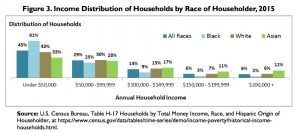Walter Benn Michaels at nonsite:
 Again, the point is not to highlight the discrepancy between the egalitarian ideals of these students and their class position since, if the equality you’re committed to is between groups, there is no discrepancy. And just as no hypocrisy is required at the elite college where you fight hard against racism, none will be required at the NGO or the job as a consultant or in finance (“Why Goldman Sachs? Diversity!”15) where you start making enough money (average salary of a Princeton grad at 34: $90,70016) to enable your kids to carry on the struggle. Actually, the need for a little hypocrisy—for virtue to pay its symbolic tribute to vice—would be an upgrade. The problem here is the literal tribute virtue’s paying to virtue—the complete identity of idealism and careerism. In other words, it’s not ethical but political.
Again, the point is not to highlight the discrepancy between the egalitarian ideals of these students and their class position since, if the equality you’re committed to is between groups, there is no discrepancy. And just as no hypocrisy is required at the elite college where you fight hard against racism, none will be required at the NGO or the job as a consultant or in finance (“Why Goldman Sachs? Diversity!”15) where you start making enough money (average salary of a Princeton grad at 34: $90,70016) to enable your kids to carry on the struggle. Actually, the need for a little hypocrisy—for virtue to pay its symbolic tribute to vice—would be an upgrade. The problem here is the literal tribute virtue’s paying to virtue—the complete identity of idealism and careerism. In other words, it’s not ethical but political.
And the demand for a working-class politics cannot be met by adding class to race and gender. This is in part because most actually existing intersectionalists are not very interested in class, but even if they were, the great attraction of intersectionality is precisely that it can absorb class too into the logic of discrimination, which is to say, into the neoliberal theory of inequality. On this theory, the fact of being born poor is a problem in the way that the fact of being born Black or Latino or a woman can be—if it keeps you from having an equal opportunity to succeed. In other words, we should treat class difference like race and gender by understanding poverty not as something we should get rid of but as something we should help people overcome.
more here.
